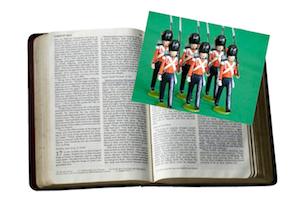 OK, let’s start looking at some of the passages we brought up from the New Testament. One of the most popular passages given to support Christians bearing arms is Luke 22:36-38—
OK, let’s start looking at some of the passages we brought up from the New Testament. One of the most popular passages given to support Christians bearing arms is Luke 22:36-38—
“He said to them, “But now let the one who has a moneybag take it, and likewise a knapsack. And let the one who has no sword sell his cloak and buy one. For I tell you that this Scripture must be fulfilled in me: ‘And he was numbered with the transgressors.’ For what is written about me has its fulfillment.” And they said, “Look, Lord, here are two swords.” And he said to them, “It is enough.”” (Luke 22:36-38)
If we apply the famous hermeneutic of “The Bible says it, I believe it, that settles it,” then the matter seems to be settled. But, alas, it doesn’t seem to be that simple.
Ben Witherington has offered a short analysis of verse 38, arguing that Jesus is rejecting the idea of sword carrying. But the passage is ambivalent enough that I think we should give it a deeper look. Linguistically, Jesus could be arguing for or against swords; what else can we find here?
In this context, what would the swords be used for? The passage Jesus quotes in verse 37 relates the instructions here to his impending arrest. Is Jesus anticipating a rise in the number of wild animals or an increase in crime following his betrayal? That seems absurd. Persecution by the Roman government? That would come eventually, but it was still decades away. No, the increased danger which Jesus was foreshadowing would come from the Jews, and it would be religiously motivated.
I’ve heard Christians argue that the teachings about loving enemies and turning the other cheek only applies to those who would persecute us. If so, this passage would seem to contradict that teaching. If Jesus is literally telling his disciples to procure weapons, it is to defend themselves against the Jews.
I would also argue that if that was Jesus’ meaning, his teachings were completely ignored. We read multiple times of the Jews persecuting Christians in the Book of Acts, and the Christians seemed to use two means of defense: prayer and flight. Fighting isn’t in there.
Patrick Mead admits to using Acts 23 in arguments against what he calls “neo-pacifists.” If Paul didn’t believe in swords being used for protection, why did he tell his nephew to inform the Romans about the plot to kill him? But that’s missing the bigger point: why didn’t Paul tell his nephew to go tell the church?
How many Christians were there in Jerusalem at that time? A conservative figure would be 10,000. Those who take Jesus literally in Luke 22 argue that Jesus approves of the ratio of one weapon for every six believers. So there should have been at least 1600 armed Christians, having purchased swords for the express purpose of protecting believers from the Jews. This was their moment! Now was the time. They knew who, they know what, they knew when. Send out those Christian special forces to do the very thing that Jesus commanded: use swords against the Jews.
So why did Paul have to tell the Romans? Surely it’s obvious. Living in a militarized society, twenty centuries after the fact, we can read Luke 22 and imagine that Jesus wanted Christians to be armed. But those living in the decades following his death understood the exact opposite. Jesus is not telling his disciples to arm themselves. He’s pointing to the impending violence which will soon lash out at the church.
That’s my theory. Feel free to punch holes in it.

